Class pets, weed boom, school robots: News from around our 50 states
Alabama
Birmingham: Declaring the COVID-19 pandemic “absolutely” managed despite lagging vaccinations, Gov. Kay Ivey said Monday that she will end a health order meant to guard against the spread of an illness that has killed nearly 11,000 people statewide. Citing improved infection rates, fewer hospitalizations and more widespread immunizations, Ivey said the current order recommending that people follow health guidance and requiring some precautions for senior citizens and long-term care facilities will end May 31, barring a sharp rise in cases. The declared state of emergency will end July 6, she said in a statement. “For over a year now, Alabamians, like people around the globe, have made sacrifices and adjusted to a temporary ‘new normal.’ We have learned much since last year, and this is absolutely now a managed pandemic. Our infection rates and hospitalizations are in better shape, and over 1.5 million Alabamians have had at least one shot of the COVID-19 vaccine,” Ivey said. Still, Dr. Ellen Eaton, an infectious disease specialist at the University of Alabama at Birmingham, said physicians are seeing more and more young, unvaccinated COVID-19 patients. With only 22% of Alabamians fully vaccinated, leaders should aim for more widespread protection before any return to business as usual, she said.
Alaska
Sitka: An advocacy group is evaluating the use of tiny homes to provide housing for people in the city who are homeless. Gayle Young, co-founder of the Sitka Homeless Coalition, said there are few services in the southeast Alaska city for those who are homeless, and over the years a number of groups have worked on ideas to fill in the gaps. A project on which her group is working involves building a tiny-home community to help provide a safe place to stay. Young estimates between 15 and 25 people in the city of about 8,500 residents are chronically experiencing homelessness. Young said most of those who have not had a home for years are men who were raised in Sitka and are now in their 50s and 60s, Alaska’s News Source reports. She said they often leave Sitka on a ferry in the winter due to limited services. Planning for the tiny-home community is in its early stages. For example, there still needs to be a feasibility analysis, identification of partners, and development of a business and financing plan. The plan envisioned would involve a plot of land north of town, with at least 12 tiny homes and a building for laundry and showers, Young said. Coalition members also would like to develop a community atmosphere with communal features like a fire pit, she said.
Arizona
Phoenix: Jobless residents will again have to show they’re looking for work in order to receive unemployment benefits after Gov. Doug Ducey announced Monday that he will stop waiving the job-seeking requirement. Ducey said state officials will begin enforcing the rule during the week of May 23. He waived the mandate in March 2020 when some businesses were ordered to close to slow the spread of COVID-19. Ducey, a Republican, said it’s time to reinstate the mandate because all adults now have access to the COVID-19 vaccine, and there are plenty of jobs available. Everyone currently eligible for unemployment benefits will continue to receive them as long as they show that they’re actively looking for a job, according to Ducey’s office. In other coronavirus developments, Pima County and the Federal Emergency Management Agency launched two mobile vaccination unit Monday in an eight-week effort to provide vaccinations in the hardest-to-reach communities. Each unit will offer 250 vaccines at a site in and around Tucson for three days before moving to another one. The locations include Pima Community College campuses, casinos and Rillito Race Track. Both units will accept walk-ins. The mobile sites will be held in Pima County through June 26.
Arkansas
Little Rock: The state’s finance office on Tuesday said Arkansas’ surplus for the current fiscal year has grown to nearly $717 million. The Department of Finance and Administration said the state’s net available general revenue for the fiscal year that began July 1 now totals nearly $5.5 billion. That’s more than $651 million more than the state reported at the same time a year ago, the department said. The state’s net revenue in April totaled nearly $780 million, which was $242 million above the same month last year and nearly $167 million more than was forecast. The department said net available revenue came in better than the forecast in nearly all major tax categories last month. Individual income tax collections were $2.3 million above forecast, while sales tax collections were $81.7 million above forecast. Corporate income tax collections were $63.2 million above forecast.
California
Los Angeles: Capacity at restaurants, breweries and more will be allowed to double to 50% as Los Angeles and San Francisco lead the way toward a broader reopening of California businesses. On Tuesday, they became the first major urban areas in the state to meet infection thresholds to move into the least-restrictive tier for reopening, allowing indoor bars to welcome people again, larger crowds to cheer on Major League Baseball’s Dodgers and Giants, and expanded capacity at restaurants, movie theaters, amusement parks, gyms and other establishments. A total of seven of the state’s 58 counties are now in the so-called yellow tier, the final stage of a phased reopening plan before a projected return to business as usual June 15. The five other counties are all remote areas of Northern California. It’s a remarkable turnaround for LA considering it was ground zero for infections and deaths when California was the nation’s epicenter of the coronavirus outbreak just a few months ago. Now, the Golden State has the lowest infection rate in the country. Los Angeles County, which is home to a quarter of the state’s nearly 40 million people and has endured a disproportionate number of California’s 60,000 deaths, didn’t record a single COVID-19 death Sunday or Monday.
Colorado
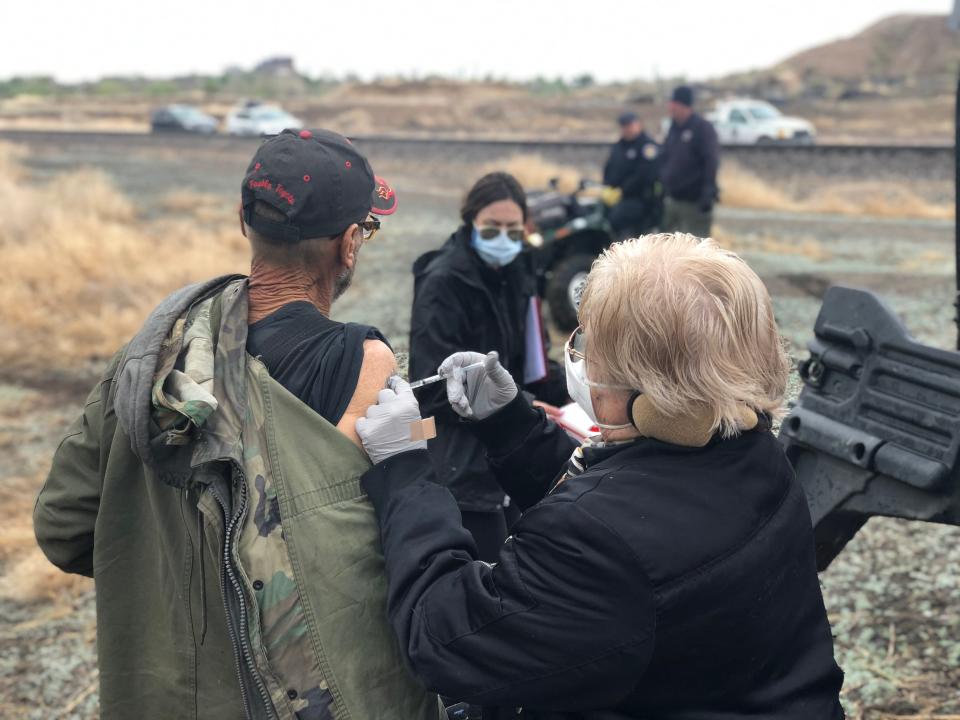
Pueblo: As part of an outreach effort targeting the homeless, the Pueblo Police Department teamed up with other local government agencies to bring COVID-19 vaccinations and bags full of food to those in need in a makeshift camp near Fountain Creek. “We’re here offering food packages with Pueblo Food Project and COVID vaccines,” said the department’s public information officer, Sgt. Franklyn Ortega. “A lot of the times, people who are living homeless here on the Fountain Creek don’t have too many resources available to them. So we want to offer these resources with food and the vaccine to try to help them out.” For the project, police teamed up with the Pueblo Department of Public Health and Environment, Pueblo Food Project, the Beulah Fire Protection and Ambulance District, and the Pueblo Fire Department to target homeless camps in west Pueblo. Pueblo Food Project supplied 60 bags of food, containing essentials like bread, bananas, peanut butter and jelly, which were distributed throughout the camps. Registered nurses from PDPHE also brought 120 doses of the Johnson & Johnson COVID-19 vaccine, which were administered to anyone that wanted them. Ortega said the J&J shot was selected because it is effective with just one dose, so there’s no need to schedule a follow-up appointment.
Connecticut
Hartford: The state plans to distribute $13 million in federal COVID-19 relief funds to 27 municipalities and local health departments to help reach residents who haven’t yet been vaccinated, Gov. Ned Lamont said Monday. While touting CDC data that shows the state is the first in the U.S. to have more than 50% of adults age 18 and older fully vaccinated, the Democratic governor said there continues to be a slowdown in the rate of vaccinations. “You can tell it’s not going up as quickly any longer,” Lamont said. “So what we are doing is reinforcing our messaging. That’s the $13 million of federal support that’s going to go out to messaging, going out to door-knocking, going out to telephone calls, working with our amazing local public health departments and community support groups, making an extra effort right now to do everything we can to convince those that are maybe a little hesitant … that this is the time to do it.” Earlier this month, the Connecticut Department of Public Health requested applications from local health districts and departments for the grant funding. Each applicant was required to describe ways their partnerships with community and medical provider groups planned to address vaccine equity in their coverage areas across the state.
Delaware
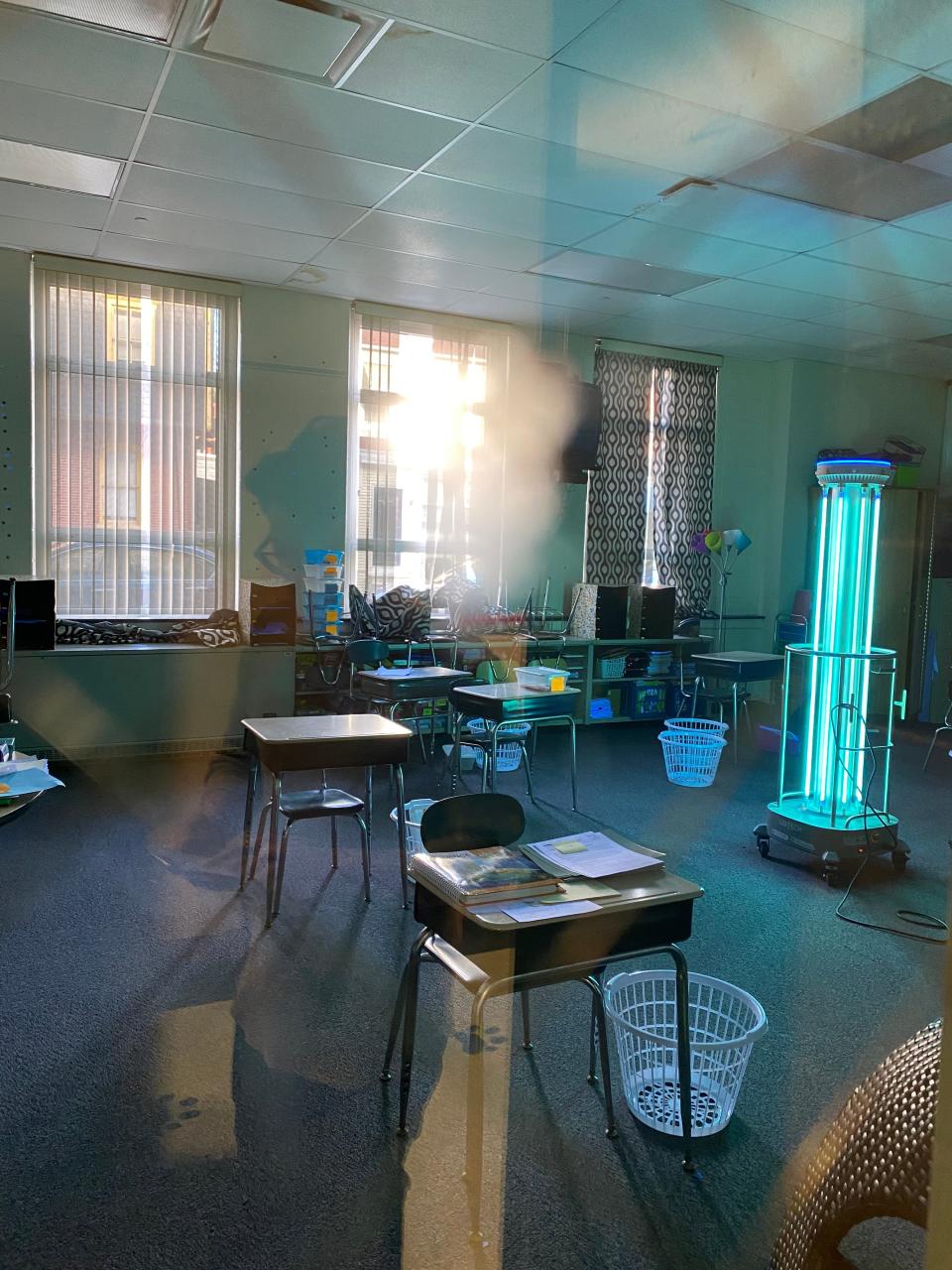
Wilmington: The Christina School District’s newest defense against the pandemic is virus-fighting robots. The district is now among the first schools in the country to use the disinfecting ADIBOTs, which use UV-C light to kill viruses like the coronavirus. After taking part in a two-week pilot program in January, the district now owns seven of the bots, paid for by a donation from Friends of Christina School District, a parent-run nonprofit. The tall cylindrical machines can be wheeled into the center of a classroom, where they emit “hot and intense” UV-C light, said Christopher Sherlock, facilities manager for the district. The ultraviolet rays break down the outer cell wall of viruses and bacteria. Unable to replicate, they die instead of spreading through a classroom. “We can disinfect any surface that the light catches in about 3 minutes,” Sherlock said. “Desks, chairs, the floor, wall, ceilings, the air. It will disinfect everything.” Before the pandemic, UV-C technology was primarily used in health care settings to sterilize operating rooms. Only recently have companies like UBTECH, which manufactures the ADIBOT, started making the disinfecting light financially accessible for schools and businesses. At $15,000 each, all seven ADIBOTs cost $105,000, said Naveed Baqir, co-chair of Friends of Christina.
District of Columbia
Washington: A D.C. pediatrician is recruiting 100 children for a Novavax COVID-19 vaccine clinical trial, WUSA-TV reports. Spring Valley Pediatrics is partnering with Meridian Clinical Research for the trial. “Kids aren’t just little adults, and so it’s really important that we study the safety and effectiveness of vaccines and treatments, devices, all specifically in children,” said Dr. Joanna Sexter, principal investigator for the trial. “And we know that we have to vaccinate kids to get them back safely and fully to day cares and schools.” Sexter said the trial will last two years, and each child will receive two doses 21 days apart. She said there will also be 11 visits throughout the trial, some in-person, some virtual. And throughout the process, she said participants will be required to fill out electronic diaries. She said it’s a placebo-controlled trial, so only some participants will receive the vaccine at first. “If they initially received the placebo, then at a particular point, during the course of the trial, they will have the opportunity to get the vaccine,” Sexter said. She said researchers are enrolling 100 children ages 12 to 17. In the future, she said there should be trials for those 6 to 11 years old.
Florida
Fort Lauderdale: A school district is encouraging eligible students to get vaccinated by bringing COVID-19 shots to their campuses. Starting Tuesday, the Broward County School District is offering vaccines at all its high school campuses over an eight-day span, the South Florida SunSentinel reports. The vaccine will be administered by the county’s health department on a walk-up basis, officials said. Students 16 and older are eligible to receive the Pfizer vaccine, which will also be offered to school staff, faculty and parents, the newspaper reports. Anyone under 18 must be accompanied by a parent to get a shot. “I think the health department is looking for unique ways to get the whole community vaccinated, so this is just another way that they can ensure that everyone has access to it,” Broward Schools Chief Portfolio Services Officer John Sullivan said. “So we’re very happy to partner with them to make it available to our school community.” The health department will return in three weeks for the second shots. In Orlando, some 1,500 students and their families turned out to get vaccines at three high schools Wednesday through Saturday, WKMG reports. Orange County Mayor Jerry Demings announced last week that mobile sites will be popping up around the area as officials move toward more community-driven vaccine events.
Georgia
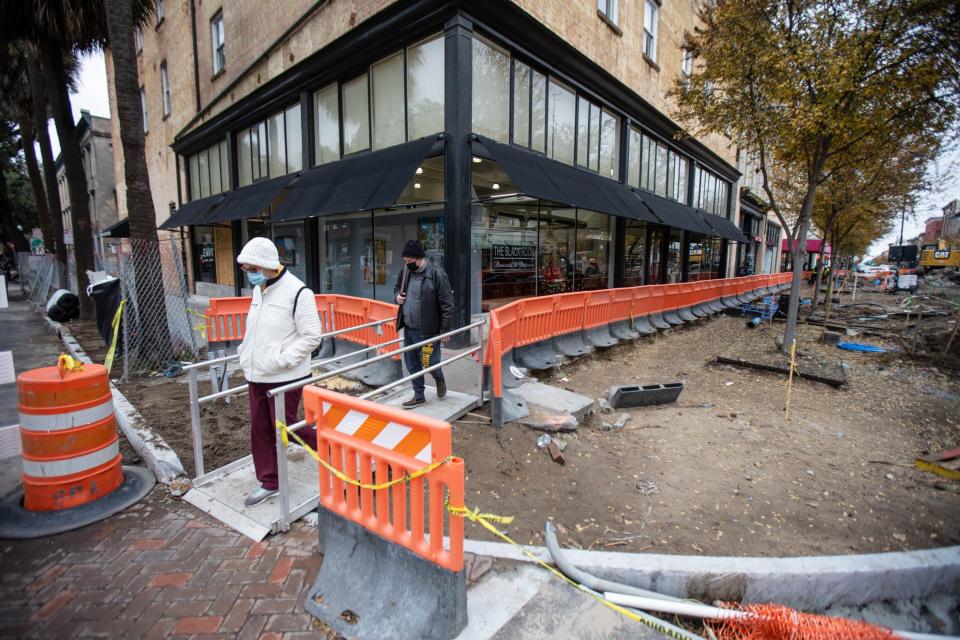
Savannah: Some business owners blame a prolonged construction project for keeping customers from their doors. The state’s oldest city is seeing a healthy rebound in tourism a year after the coronavirus pandemic struck, WTOC-TV reports. But shops in a two-block area of Broughton Street in Savannah’s historic district aren’t getting much of that business because of paving and landscaping work that’s shut down part of the road. David Huynh, who owns Envy Nail Bar on the normally busy downtown thoroughfare, said his business is down 55% over the past year. He blamed construction work that has reduced the foot traffic on which Huynh relies for walk-in customers. “We gauge it with the other business owners down the street; they have higher foot traffic,” Hyunh said. “And when you get to this side of Broughton, it’s dead. It’s a ghost town on this side.” The construction project is repaving the busy street and adding new trees, sidewalks and parking. Work on the first phase near Hyunh’s salon was supposed to take a few months but has now lasted more than a year. City officials say that’s because some construction materials were hard to get during the pandemic. Crews also had to deal with some decaying water mains in the area.
Hawaii
Honolulu: The pandemic is putting the brakes on the city’s bicycle-sharing program. Known as Biki, the program is considering decommissioning as many as 50 of about 130 stations currently in service, Bikeshare Hawaii Executive Director Todd Boulanger said. The pandemic has taken a financial toll on the program launched four years ago, and the next three to six months will be crucial in determining its future, Boulanger said. The program logged 1.4 million rides in 2019, but the number of trips and generated income were slashed in half when the pandemic hit, Hawaii News Now reports. It’s possible Biki will have to completely shut down, but Boulanger would like to see the program integrated into the city’s strategy for more eco-friendly transportation. Honolulu Mayor Rick Blangiardi said he has asked transportation officials to gather financial and operational data for the program “so my administration can evaluate the need and consider options to keep our city’s bike-share system alive and well.” Blue Planet Foundation, which is focused on accelerating clean energy usage, started a petition to show that Biki is essential. Blue Planet Communications Director Leigh Anne Mayberry said the goal would be to get Biki recognized as public transportation, then funded and included in that public transportation network.
Idaho
Boise: The Republican-dominated state Senate on Tuesday failed for the second time to override GOP Gov. Brad Little’s veto of a measure seeking to curb a governor’s power to respond to emergencies like the coronavirus pandemic. The Senate voted 21-12, falling short of the two-thirds majority needed. The pandemic spurred the legislation, with lawmakers taking aim at rules intended to stem the spread of the virus, like limiting gatherings and nonessential travel. Both bills vetoed by Little sought to give the Legislature a greater say in the handling of declared emergencies and how long restrictions associated with them could last. Democratic Sen. Grant Burgoyne voted against the override, citing the Legislature’s problems this session that is now the third-longest in state history. “If this legislative session has shown anything, it is the incapability of this Senate and the House of Representatives to handle an emergency in the manner that the executive would,” he said. “The override of this veto would constitute a clear and present danger to the people of this state.” Supporters of the measures said the governor has too much power during emergencies. Opponents said the Legislature shouldn’t have emergency authority because it would be too slow to act during a time of crisis.
Illinois
Springfield: Indicators of coronavirus transmission appear to be on track to allow the state to transition to the “bridge phase” of economic reopening sometime next week, Gov. J.B. Pritzker said Monday. “It feels to me, it looks to me, if you look at the hospital admissions data, like we’re in decent shape and moving exactly as I would hope we would toward the bridge phase,” he said at a news conference in Chicago. Pritzker also said the Illinois State Fair in Springfield will go on as planned Aug. 12-22, after a year’s hiatus because of the pandemic, “barring some highly unusual event occurring that would prevent a large gathering” at what he called “a very large fairgrounds.” “I am very much looking forward to the Illinois State Fair,” the Democrat said. “I think we’re going to have a lot of fun this summer.” When it comes to Illinois’ potential move from the current Phase 4 restrictions to the bridge phase, the prediction Pritzker made Monday was much the same as one he made a week ago. He said his minimum requirements for the percentage of the population vaccinated have been met, while hospital admissions for patients with COVID-19 need to be “at least stable or going down.” The bridge phase would allow for fewer restrictions on retail stores, offices, and indoor and outdoor recreational activities before a full reopening.
Indiana
Indianapolis: The conservative pushback over the state’s COVID-19 restrictions is turning into a tangled legal standoff among Republicans who dominate the Statehouse. Gov. Eric Holcomb is arguing that the GOP-controlled General Assembly is violating the state constitution with a new law giving itself the power to call a special legislative session during emergencies and wants the courts to decide who is correct. Some legal experts question legal arguments that Attorney General Todd Rokita – a past Holcomb political rival – filed with a Marion County court Friday asking a judge to throw out the governor’s lawsuit because state law gives him alone the authority to determine whether the governor can even go to court. Lawyers hired by the governor’s office over Rokita’s objections filed the lawsuit last week after lawmakers voted to override Holcomb’s veto of the bill allowing what the law calls an emergency session. Holcomb said he worried any action taken by the Legislature during such a session could be challenged as illegal and lead to “significant uncertainty” during a time of emergency. While Rokita maintains the law is constitutional, long-standing legal precedents are that such disagreements between the governor and the Legislature should be decided by the courts, said former state Supreme Court Justice Frank Sullivan.
Iowa
Des Moines: The 80/35 music festival is off for the second year in a row because of COVID-19 concerns, the Des Moines Music Coalition announced Tuesday. The festival, which had been slated for July 9-10, typically draws upward of 30,000 people to Des Moines’ Western Gateway Park. First held in 2008, it has featured performances by headliners such as the Flaming Lips, The Roots, Wu-Tang Clan and Modest Mouse. DMMC instead will hold a one-day Riverview Music Festival at the Riviera at the north side’s Riverview Park on Sept. 4. Other central Iowa music festivals are making a comeback this summer, including Hinterland and Big Country Bash. DMMC board Chair Kuuku Saah said the decision to delay 80/35 to 2022 in favor of a scaled-back event was not easy. “A non-profit festival at 80/35’s scale takes an immense amount of advanced planning, volunteers, corporate sponsors, community grants, ticket sales and much more,” Saah said in a statement. “With the level of uncertainty in all of those areas, and the desire to always deliver the maximum 80/35 experience for attendees, we felt postponing was the best choice to ensure we can come back even stronger in 2022.” DMMC said Riverview Music Festival will feature national, regional and local acts, with details tobe announced this summer.
Kansas
Topeka: The state needs to boost funding for public higher education or else risk jeopardizing federal pandemic aid to public schools and universities, officials warned in a memo to legislators Monday. The warning from Budget Director Adam Proffitt comes as lawmakers wade through a heated debate on how to fund K-12 education. Republican legislators acknowledge the risk that exists to federal relief for both public K-12 education and the state’s colleges and universities. “I think it is going to be a problem,” said Rep. Troy Waymaster, R-Bunker Hill, chair of the House Appropriations Committee. State universities are in line to get more than $161 million from the latest congressional relief package alone, and school districts are set to receive $1.3 billion over the three packages approved since March 2020. The two most recent federal relief bills contain so-called maintenance of effort requirements, which in effect force states to continue funding education at a similar level as they have in the past. The state budget as written would not meet that standard for higher education funding. Proffitt suggested legislators add $159 million over each of the next two fiscal years in an effort to meet federal guidelines.
Kentucky
Frankfort: Gov. Andy Beshear signaled Monday that he will consider relaxing more coronavirus-related restrictions before the state reaches a key vaccination target. Nearly 1.85 million Kentuckians have received at least one dose of COVID-19 vaccine – slightly more than half the state’s 16-and-up population, the Democratic governor said at a news conference. With the vaccination rate slowing in recent weeks, several hundred thousand residents still need to get inoculated before hitting the threshold Beshear has set. Once 2.5 million Kentuckians receive at least their first COVID-19 shot, he has pledged to lift capacity and physical distancing restrictions for nearly all businesses, venues and events catering to 1,000 or fewer patrons. Earlier Monday during an appearance in Louisville, the state’s most powerful Republican, U.S. Senate Minority Leader Mitch McConnell, made another pitch for vaccines, saying they’re “the only thing that ultimately gets us out of” the pandemic. “It is disturbing to see that vaccinations seem to be receding, as everybody kind of thinks it’s over. For whatever audience I have, I want to encourage everybody: Finish the job.” Acknowledging that fatigue has set in regarding mask-wearing and other virus-related restrictions, Beshear said that “we’re going to work on loosening” more rules.
Louisiana
Broussard: A company that makes personal protective equipment will open two factories near Lafayette, hiring more than 1,200 people. SafeSource Direct made the announcement Monday, saying it would invest $150 million in the venture. The company is a joint venture of Jefferson-based Ochsner Health, Louisiana’s largest hospital system, and Trax Development. SafeSource Direct will make and sell equipment to health care and other industries in Louisiana and nationwide. “COVID-19 brought to light our nation’s dependence on foreign countries, primarily China, for PPE,” CEO Justin Hollingsworth said in a statement. SafeSource Direct will spend $73 million to renovate an 80,000-square-foot building in Broussard that will serve as SafeSource’s headquarters and as a factory for masks, hair covers, shoe covers and isolation gowns. The company will spend another $77 million to build a 400,000-square-foot factory in nearby St. Martin Parish with multiple manufacturing lines, with its main product planned to be nitrile rubber gloves. “Even now, the need for PPE is great, and that demand will continue for the foreseeable future,” Gov. John Bel Edwards said. “I am proud to say that, with this new project, Louisiana will play a key role in preventing the U.S. from facing such a shortage again.”
Maine
Portland: The state’s largest city is preparing for another election that will be disrupted by the coronavirus pandemic. Portland is scheduled for a special municipal election June 8 that will concern the Charter Commission and school budget referendum. City officials are promoting the use of absentee voting, as they did during the 2020 general election. Absentee ballots will become available early this month and provided to voters, officials said. The last day to request an absentee ballot is June 4. Polls will also open at 7 a.m. on the day of the election, officials said. Portland officials said polling locations will once again also look different than during a typical year because of the pandemic. Voting booths will be spread out, and election workers will have plexiglass barriers and personal protective equipment, officials said. City officials said Portland voters are also encouraged to wear a face covering when voting.
Maryland
Annapolis: The state will offer a $100 incentive for state employees to get a COVID-19 vaccine, Gov. Larry Hogan announced Monday. The Republican governor described it as another way to reinforce the importance of getting vaccinated. Hogan is encouraging businesses across the state to consider offering incentives to their workers as well. All state employees who are fully vaccinated against COVID-19 are eligible. To receive the incentive, employees must provide proof of vaccination and agree to receive all subsequent Centers for Disease Control and Prevention-recommended booster vaccinations within 18 months of being fully vaccinated. The incentive is retroactive, so state employees who already have been fully vaccinated will be eligible. People who refuse subsequent CDC-recommended booster vaccinations, after receiving the vaccination incentive, will be required to repay the $100. According to official CDC data, 62% of Marylanders 18 and older and 84.8% of those 65 and older have received a COVID-19 shot.
Massachusetts
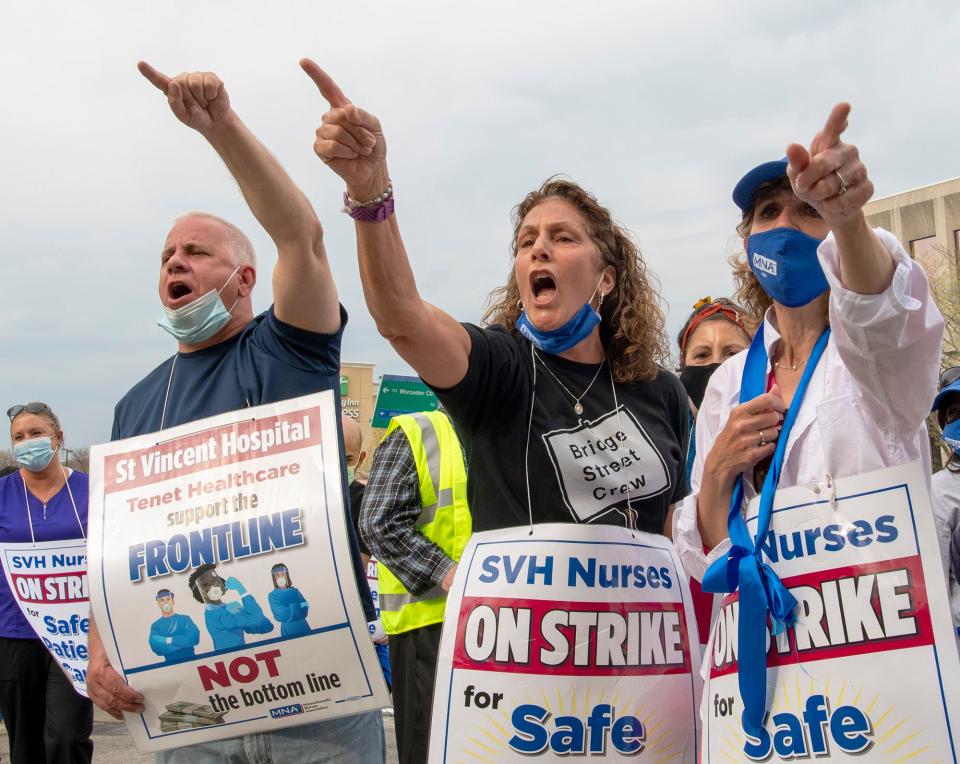
Worcester: Striking nurses and leaders at St. Vincent Hospital are scheduled to return to the bargaining table Wednesday morning, after the hospital presented a new proposal for staffing Saturday. “The hospital’s offer was very complex, and the nurses have been meeting and will be meeting all day today to craft a comprehensive proposal to present on Wednesday that will provide what we need to end the strike,” David Schildmeier, the spokesman for the Massachusetts Nurses Association nurses union, said in an email Monday. “We look forward to negotiating as long as it takes to reach a settlement.” St. Vincent Hospital CEO Carolyn Jackson also welcomed the negotiating session. “I am hopeful they will accept the proposal completely or with minor changes when they come back,” Jackson said Monday. Monday marked the 57th day of the strike – the longest nurse strike in Massachusetts in two decades, according to the union – as the hospital and nurses remained at odds over staffing. Nurses are mainly advocating for a 1-to-4 ratio of nurses to patients on medical or surgical floors and telemetry units, in most cases, with a resource nurse to pitch in; increased staffing in the emergency department; and ancillary support in each unit. The nurses have said the current, primarily 1-to-5 ratio is unsafe.
Michigan
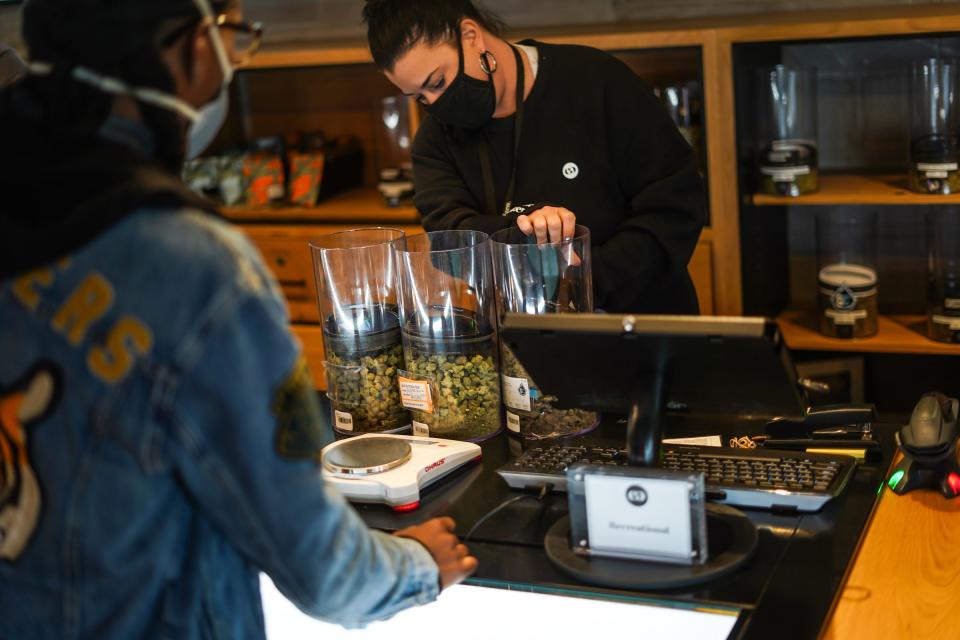
Detroit: While many businesses have struggled to stay afloat, the state’s budding recreational marijuana industry has flourished amid a growing acceptance of cannabis use and a surge in new consumers turning to the plant to deal with the stresses brought on by the pandemic. Michigan’s adult-use marijuana market opened up just a few months before the state announced its first COVID-19 cases. The industry has grown steadily since then. Sales in the adult-use market have more than quadrupled during the pandemic, starting at $21.9 million in March 2020 and reaching nearly $97.6 million in March 2021, the latest sales figures from the Marijuana Regulatory Agency show. For consumers, an increase in supply has helped bring down prices at a time when retailers say pandemic-induced stress has grown their customer base. To reach their customers, retailers have added curbside pickup and delivery and even changed their product lineup. Mike Elias, CEO of Common Citizen, with retail locations selling recreational-use products in Battle Creek, Flint and Hazel Park, said his stores turned to more “COVID-friendly” products. The company, for example, started making smaller joints designed for individual use as opposed to large ones meant to be passed around at social gatherings.
Minnesota
Minneapolis: Health officials say the state saw a 27% increase in drug overdose deaths last year, with the first, largest increase coinciding with the outbreak of COVID-19. According to the Minnesota Department of Health, 1,008 residents died of drug overdoses in 2020. Drug-related deaths increased 64% in March 2020 compared with the previous year, then peaked at more than 100 fatalities in the months of May and August. Outreach resources became limited due to the pandemic. “With COVID there’s this terrible storm about lack of access to treatment medications, housing and treatment facilities,” said Dr. Ryan Kelly, an assistant professor of medicine at the University of Minnesota Medical School. Kelly said people died because of limited access to treatment, the Star Tribune reports. “COVID has led to a huge increase for a lot of reasons,” said Marissa Bonnie, who does outreach for Southside Harm Reduction Services in Minneapolis. “A lot of people have isolated way more, which can lead to people using alone or having limited resources.” That includes access to lifesaving naloxone, which can reverse the effects of an overdose, as well as clean needles to prevent infections, Bonnie said. As in previous years, opioids are among the substances that led to the most overdose deaths.
Mississippi
Hattiesburg: The mayor says he’s considering lifting the city’s mask mandate, which remains in place even after Gov. Tate Reeves removed nearly all pandemic-related statewide orders, but more residents need to get COVID-19 shots. Hundreds of first-dose vaccine appointments are going unfilled every day, Mayor Toby Barker said Monday, which he called concerning. “We can do better if more of us will go and encourage our friends and neighbors to get their vaccine as well,” Barker said. Hattiesburg’s current mask order expires at 5 p.m. May 15, but whether it will be lifted or extended is yet to be determined. Barker said the mandate was previously extended to allow everyone a chance to get vaccinated, and he encouraged anyone who has not been vaccinated to make an appointment. He said case numbers and hospitalizations must remain low if the mask mandate is to be lifted. “We’re on track to do that, but we know there are still a large portion of both Forrest and Lamar counties who have not received their vaccine yet,” Barker said.
Missouri
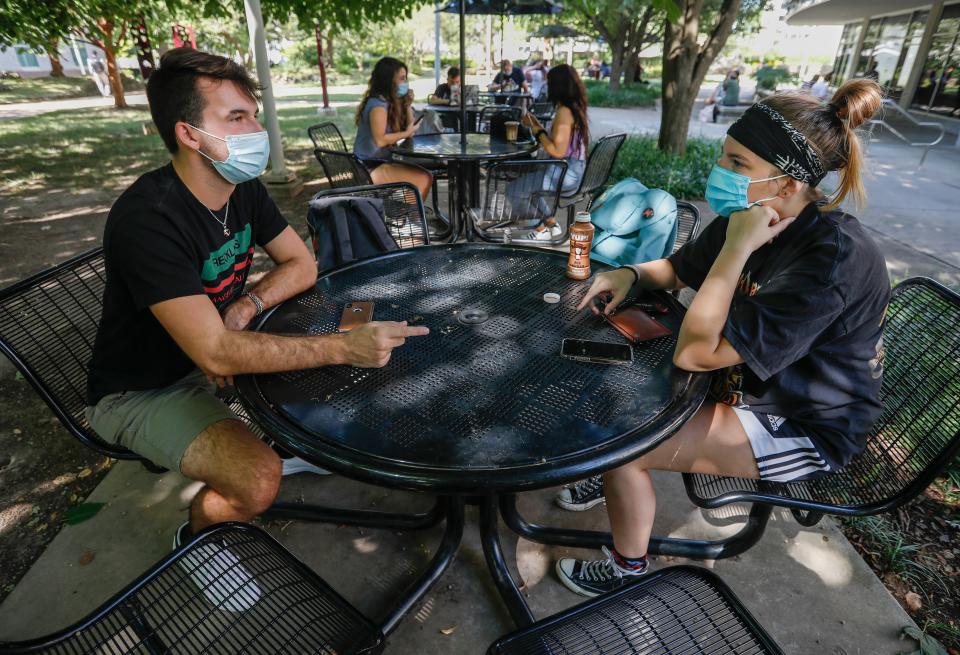
Springfield: The state’s third-largest city is easing its coronavirus restrictions, at least for outdoor activities. The Springfield City Council on Monday passed a bill removing the requirement that people wear masks outdoors in most cases. In a news release, the city cited new Centers for Disease Control and Prevention guidelines that say fully vaccinated Americans don’t need to cover their faces outdoors anymore unless they are in crowds. The Springfield-Greene County Health Department determined that just 1,043 of the 28,800 confirmed cases of COVID-19 in those counties since the start of the pandemic were linked to outdoor exposure, with most of those happening at large gatherings such as sporting events. St. Louis city and county on Monday lifted their limits on the number of people allowed in restaurants, with officials citing a decline in new COVID-19 cases and increased access to vaccines. Restaurants must still space tables at least 6 feet apart, and masks are required indoors and outdoors if there isn’t enough space to socially distance. The state health department announced that its weekly review of death records found 66 additional COVID-19-related deaths. All told, Missouri has recorded 8,814 COVID-19 deaths and 503,615 confirmed cases since the start of the pandemic.
Montana
Helena: Gov. Greg Gianforte announced Tuesday that the state will end its participation next month in the federal unemployment program as it struggles with a worker shortage. Beginning June 27, unemployed workers will no longer receive $300 in extra weekly benefits, forgoing pandemic-related payments that were approved through Sept. 6. Instead, the state will launch a new program to provide bonuses to unemployed workers who return to work. “Montana is open for business again, but I hear from too many employers throughout our state who can’t find workers. Nearly every sector in our economy faces a labor shortage,” Gianforte said in a statement, adding that the federal unemployment benefits are “doing more harm than good.” Under the new incentive program, workers currently receiving unemployment benefits can qualify for a one-time $1,200 bonus after they have completed four weeks in a new job. The governor approved $15 million in funding for the incentives from federal coronavirus relief dollars allocated to the state. About 25,000 people are currently claiming unemployment insurance in the state, according to the Montana Department of Labor. The department also estimates there are about 14,000 job openings in the state.
Nebraska
Omaha: The number of new coronavirus cases in the state has declined to levels not seen since last July, but the pace of vaccinations is also slowing down across Nebraska. The state reported 1,166 new cases during the seven days that ended Saturday, according to the Omaha World-Herald. That’s down 29% from the 1,653 cases reported the week before. “We are going in the right direction,” Douglas County Health Director Adi Pour said. The seven-day rolling average of daily new cases in Nebraska decreased over the past two weeks, going from 323.14 new cases per day April 18 to 199.00 new cases per day Sunday. The state said more than 70,000 COVID-19 vaccine doses were administered across Nebraska last week. But that is down from 93,284 doses the week before and well below the mid-April peak of 211,057 in a week. More than 45% of the state’s population has now been fully vaccinated against the disease, and 1.46 million doses have been given statewide. The state said 220,481 COVID-19 cases and 2,244 deaths have been reported since the pandemic began. The number of people hospitalized with the virus in the state remains relatively low at 139.
Nevada
Reno: Local authority over pandemic restrictions has now been granted to all of the state’s 17 counties after Washoe County commissioners approved a revised plan for the Reno-Sparks area Monday and successfully submitted the necessary endorsements to the state’s mitigation task force. Masks remain mandatory, but control over most all other COVID-19 mitigation measures began May 1 under local plans in Las Vegas and all other Nevada counties, where capacity limits and social distancing limits vary through the end of the month. Gov. Steve Sisolak, a Democrat, has set a June 1 date for lifting coronavirus mitigation restrictions statewide, including all capacity caps, with the exception of a mask mandate. Washoe County’s new plan allows full capacity in businesses that have enough space to comply with a 6-foot social distancing mandate. In Las Vegas and Clark County, the capacity cap rose from 50% to 80% on Saturday and will be eliminated when 60% of eligible residents have received at least one dose of a vaccine. On Monday, the percentage was 47% in Clark County. It was 45.4% statewide and 53% in Washoe County. Health officials say they hope to administer more than 1,000 doses a day at a big drive-thru COVID-19 shot clinic that opened Tuesday at the Las Vegas Convention Center.
New Hampshire

Concord: Independence Day fireworks celebrations are returning to some communities, though they come with changes. In Portsmouth, the City Council voted to hold the celebration July 3, with a rain date of July 5. Last year’s event was canceled because of the coronavirus pandemic. City Manager Karen Conard said this year there will be no entertainment, food or vendors “so as to discourage gathering.” The Fourth of July fireworks display in Dover was moved to an area that will allow more of a 360-degree view for spectators, organizers said. “We usually see between 8,000 to 10,000 people in downtown Dover for a typical Fourth of July,” said Gary Bannon, the city’s recreation director. “We needed a location that would provide enough room for people to spread out. This location allows a lot of people to see it from their neighborhoods, too, so they can meet with their neighbors and safely have more smaller group settings outside.”
New Jersey
Trenton: The state will begin focusing on municipalities with low vaccination numbers to boost rates and reduce the spread of COVID-19. Gov. Phil Murphy in his press conference Monday listed 16 municipalities with populations over 10,000 where less than 40% of residents had received a first vaccine dose. As part of Murphy’s “Operation: Jersey Summer,” the state will work to encourage more residents to get shots. On the list were Garfield and Fairview in Bergen County, plus the city of Passaic. “This is not going to be a competition between towns and communities and/or meant to shame any community,” Murphy said. “To the contrary, having these numbers out there for everyone to see is important to ensure everyone is working and pulling together.” The Democratic governor said the state is putting together “an army of boots on the ground safely knocking on doors” in underserved communities across New Jersey to supply information and resources. A call center at the Department of Health will contact residents who preregistered for a vaccine but haven’t made an appointment. The state will continue to work with local religious leaders for a new initiative called “Grateful for the Shot” to make it possible for congregants to go directly from religious services to vaccination sites, Murphy said.
New Mexico
Santa Fe: Legislators will return in July to in-person committee meetings amid evidence of retreating coronavirus infections and risks, the state House speaker announced Monday. Legislative hearings have been conducted largely by web conference since spring 2020 as a precaution against the pandemic. “We’re going to return to our normal protocol of in-person meetings just like before the pandemic,” House Speaker Brian Egolf, D-Santa Fe, told a panel of leading legislators via videoconference. The Capitol building reopened to the public last week, and a lead budget-writing committee gathered on the floor of the House of Representatives to hear testimony from a top state health official and other experts. Also Monday, Democrats appointed a new task force on rural economic opportunity and shuffled leadership posts on some year-round committees. First-term Sen. Siah Correa Hemphill of Silver City and state Rep. Candie Sweetser of Deming will together lead the new task force as co-chairwomen to identify barriers to rural prosperity and bring forward proposals to ensure universal access to full indoor plumbing, electricity and internet that often are unavailable in remote areas of the state. Sen. Bill Soules of Las Cruces will take the reins as chairman of the Legislative Education Study Committee.
New York
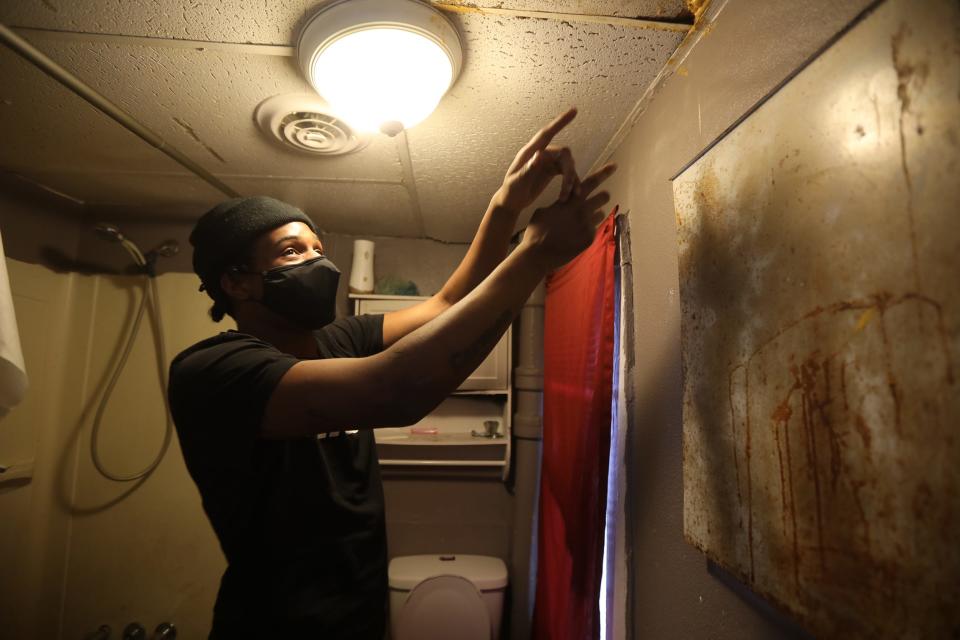
Albany: Lawmakers passed a bill Monday to extend eviction protections for tenants affected by the COVID-19 pandemic amid growing calls for them to protect landlords from further income losses. Both the COVID-19 Emergency Eviction and Foreclosure Prevention Act of 2020, touted as one of the strongest pieces of anti-eviction legislation in the nation, and the COVID-19 Emergency Protect Our Small Businesses Act of 2021, meant to provide eviction and foreclosure protection for small businesses, went into effect in late Dececember and expired Saturday. The Legislature voted Monday afternoon to extend the programs until Aug. 31. An unofficial tally showed the Senate passed the bill 42 to 21, and the Assembly later passed it 91 to 57. “This new extension will continue to ensure that New York tenants, homeowners, business owners and small landlords will not have to fear losing their homes or businesses,” Senate Majority Leader Andrea Stewart-Cousins said. “This pandemic has been devastating on so many levels, and this legislation will help give our residents and businesses time to get back on their feet.” It will now be up to Gov. Andrew Cuomo to sign or veto the bill.
North Carolina
Raleigh: State House members no longer have the option to cast floor votes remotely – a result of improving conditions during the COVID-19 pandemic. The House returned this week to operating rules in which members must be present in the chamber to vote. House leaders offered proxy voting starting last spring. Members concerned about contracting the coronavirus could vote from their homes or offices through the majority or minority leader. Those emergency operating rules rolled over into the first months of this year’s session. The number of members using proxy voting has dwindled as more legislators have received COVID-19 vaccines. Still, committees can continue to use online technology to conduct hybrid meetings, Speaker Tim Moore said. The Senate never offered proxy voting but continues to let senators participate in committees online. Indoor mask-wearing has been encouraged but never required in the legislative complex. Legislative building security stopped taking visitors’ temperatures last month.
North Dakota
Bismarck: The state Department of Health is encouraging residents to get vaccinated and continue to practice prevention measures to reduce the risk of spreading COVID-19. The increase in the number of active cases since early March, the emergence of new coronavirus variants and the increase in the number of hospitalizations highlight the fact that the virus is still circulating in the state, the agency said. The state’s emergency declaration was lifted Friday, but “COVID-19 cases continue to be reported from our communities in North Dakota, and people continue to be hospitalized for COVID-19,” said Kirby Kruger, disease control and forensic pathology section chief. Interim State Health Officer Dirk Wilke said residents should “keep using preventative measures including physical distancing, wearing a mask when you can’t distance, getting tested and most importantly getting vaccinated.”
Ohio
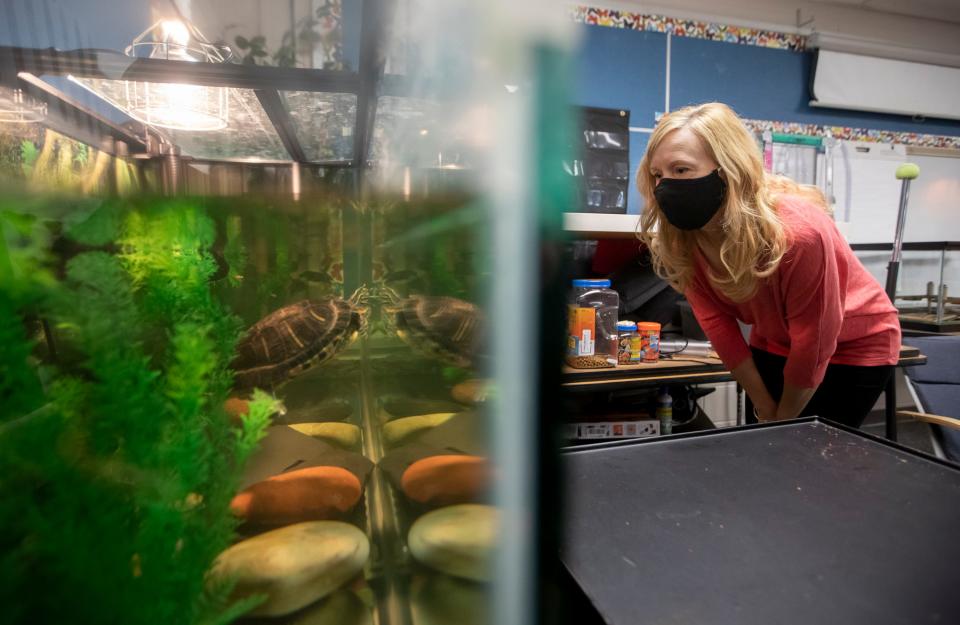
Columbus: As teachers pivoted to online learning last school year, some faced a unique challenge: What would happen to their class pets? “Those are some of the pandemic things people don’t think about,” said Katie Guehl, a fourth grade teacher at Indian Run Elementary School in Dublin. Kids “are excited to befriend her,” Guehl said of Daphne Phyllis, a red-eared slider turtle. “They may not remember my math lesson at the end of the day, but they’ll remember feeding the turtle.” Daphne Phyllis went between the houses of two students during the spring and summer. Guehl, who is still teaching remotely because of parent requests, brought the turtle back to the classroom in the fall and starts every school day by wheeling her laptop on a cart right up to the tank. “Class pets are definitely more fun when you have the children in the room,” she said. Kyle Campbell, a zoology teacher at Westerville North High School, has 23 tanks in his classroom full of species including an alligator, turtles, snakes, toads, a bearded dragon, crabs, geckos, catfish and a tarantula. He couldn’t take all the animals home when schools closed last spring, so he went into the classroom three days a week throughout the spring and summer to take care of them. “The pandemic wasn’t good for anybody, but it was hard on the animals, too,” he said.
Oklahoma
Oklahoma City: Gov. Kevin Stitt lifted the state’s COVID-19 emergency declaration, effective Tuesday, citing data that shows declining new cases and hospitalizations. Stitt noted that Oklahoma’s seven-day average of new cases is down 94% from its peak and that hospitalizations also are down 90% and have stabilized over the past two weeks. “My promise has been to make decisions based on the data in our state, not what’s happening anywhere else,” the Republican governor said. The emergency declaration eased some licensing restrictions for medical professionals and gave state agencies more flexibility to shift funding and employees to respond to the pandemic. The ending of the emergency will also require governmental bodies to begin meeting in person within 30 days.
Oregon
Portland: A lack of adequate shelter beds has long plagued the state, where a recent estimate suggests 10,000 people sleep outside on any given night – a number that has likely increased during the pandemic. But on Monday, lawmakers passed a bill that will make it easier and quicker for communities to create emergency shelters and temporary housing. House Bill 2006, which the Senate passed 26-1, will remove barriers to siting shelters by temporarily adjusting land use laws and waiving some design, planning and zoning regulations. “Multiple cities have come out in support of the bill because they recognize the need in their communities – in every community – for us to take steps toward alleviating the suffering of our neighbors who have lost their housing,” Sen. Deb Patterson, D-Salem, during the Legislature’s floor session. “It should not take an emergency for us to recognize this need. But we are in an emergency now. We must act.” A similar bill was passed in June but expired after 90 days. The new bill, awaiting consideration by Gov. Kate Brown, would expire in July 2022. The state’s 2019 point-in-time count indicated nearly 16,000 people were experiencing homelessness, with 10,000 living in unsheltered locations. Experts say the pandemic and 2020 wildfires have likely exacerbated the situation.
Pennsylvania
Harrisburg: The state will lift all COVID-19 restrictions – except an order to wear a mask while in public – on Memorial Day, the Wolf administration announced Tuesday, promising to restore some semblance of normalcy more than a year into pandemic. Capacity restrictions on bars, restaurants and other businesses, as well as indoor and outdoor event gathering limits, will go away May 31, the Department of Health said. The state made the announcement with little fanfare, via news release. “We continue to make significant progress in the fight to stop the spread of COVID-19 and as more Pennsylvania adults get vaccinated and guidance from the CDC evolves, we can continue to move forward with our reopening efforts,” Acting Health Secretary Alison Beam said in the statement. The Health Department said an order requiring people to wear masks while away from home will be lifted once 70% of Pennsylvanians age 18 and up are fully vaccinated. That percentage stood at nearly 42% on Tuesday, according to federal data, while 63% of adults had received at least one dose of a COVID-19 vaccine. The Health Department said municipalities and school districts can continue to impose their own restrictions.
Rhode Island

Providence: Federal authorization to use Pfizer’s COVID-19 vaccine for children ages 12 to 15, which is expected to come soon, will not only help get more of the general population protected but also help improve prospects for fully reopening high schools in the fall, coronavirus expert Dr. Ashish Jha said Tuesday. “Right now, we have about 44% of Americans who have gotten at least one shot. These 12- to 15-year-olds represent another about 4% or 5% of the population – about 16 million,” Jha, dean of Brown University’s School of Public Health, said in his weekly podcast hosted by the Providence Journal. “Let’s say half of them get vaccinated in the next month or so. That will cause another dampening effect on lowering infection rates across the country.” When schools reopened this past year, high schools were always the hardest-hit by coronavirus outbreaks. With more high school students vaccinated, “there just is no explanation anymore and no medical and public health reason that high schools cannot be open 100%, full-time normal, this fall,” he said. He also said he expects the federal government this summer to lift the emergency use authorization label from the Pfizer and Moderna vaccines and give them full license status, which could ease hesitancy to get a shot.
South Carolina
Charleston: Private schools and colleges asked a federal judge Monday to strike down the provision in the state’s constitution that bars public money for private and religious schools, saying the 1895 measure is discriminatory. The Roman Catholic Diocese of Charleston and South Carolina Independent Colleges and Universities filed the lawsuit last month. The state Supreme Court has blocked Gov. Henry McMaster’s efforts to share COVID-19 relief money with private schools or private school parents, citing the state constitution. Daniel Suhr, an attorney for the plaintiffs with the Washington, D.C.-based Liberty Justice Center, told U.S. District Judge Bruce Hendricks on Monday in Charleston that the amendment is blocking historically Black colleges and universities and Catholic schools from receiving “fair, equitable access” to the money. “South Carolina has come a long way since 1895,” Suhr said, according to The Post and Courier. “But though the state has come a long way, its past is with us still.” The provision is one of a number of “Blaine Amendments” embedded in state constitutions, named after Maine Republican James Blaine, who advocated for them in the late 1800s as a way of blocking public money from going to Catholic schools.
South Dakota
Sioux Falls: At the recommendation of university presidents, a systemwide mask requirement for all public indoor spaces on campuses in place since last fall will end next week. Masks will be optional at the state’s public universities starting Monday, the South Dakota Board of Regents announced Tuesday. “Our system has continuously responded to changing circumstances caused by the (COVID-19) pandemic,” Regents executive director and CEO Brian Maher said in a statement. “With vaccines now widely available, our institutions are eager to adjust as we look forward to the fall semester.” Administrators will continue to monitor conditions, making “the best decisions possible” with information available to them, Maher said. The announcement follows the Regents’ plan for a return to normal campus operations this fall.
Tennessee

Nashville: For Brad Paisley, getting a COVID-19 shot at Expo Park in Franklin felt like a patriotic act. “It was emotional seeing the National Guard – in many ways on the forefront of defending this country – manning the post of making that (vaccine) available,” he said. “We can’t let the noise drown out the achievement here.” Paisley spent much of the past month encouraging others to get inoculated, a vital step to return to normalcy in a live entertainment industry bulldozed in the last year by COVID-19 cancellations and restrictions. He appeared in a national public service announcement produced by Vanderbilt Health that shows him inside an empty Bridgestone Arena, encouraging viewers: “Be a fan. Take the shot.” But Paisley and the health community face an uphill battle in the South, where vaccine hesitancy deeply intertwines with divisive politics. In Tennessee, the most conservative counties lag the furthest behind, per a recent USA TODAY Network investigation. Still, Paisley stands with Dolly Parton, Willie Nelson and others in mainstream country music who encourage listeners to get a vaccine. He returns to the road this summer – including a headlining performance at Nashville’s 4th of July celebration, billed by the city as its “first major post-pandemic event” – and hopes to perform for audiences of mostly vaccinated or immune onlookers.
Texas
Austin: Objecting to COVID-19 vaccines as “experimental injections” and coronavirus tests as invasive medical procedures, Agriculture Commissioner Sid Miller asked a state judge Tuesday to void Texas Senate rules limiting access to Capitol visitors who obtain a negative test or show proof of vaccination. “I believe in the statement in the constitution that the citizens of Texas have the right to petition their government,” Miller testified. “I can’t see where it says if they’ve taken a COVID vaccine, or if they’ve taken a COVID test, or they take a, you know, strep test or if they take an HIV test.” During a three-hour hearing, he told state District Judge Jan Soifer of Travis County that the requirement “restricts the public’s access.” Senators unanimously adopted rules for this legislative session that require a negative virus test, administered at no cost at the Capitol’s north entrance, to get a wristband granting access to a committee hearing room or the gallery overlooking the Senate floor. Those showing proof of vaccination can also get a wristband. Lawyers for Attorney General Ken Paxton defended the rule as a reasonable effort to protect health and ensure the Senate’s continued operation under authority granted by the Texas Constitution. Soifer ended the online hearing by saying she hoped to issue a ruling by Friday.
Utah
Salt Lake City: The state reported 2,581 new coronavirus cases in the week ending Sunday, down 3.5% from the previous week. Utah ranked 34th among the states where the virus was spreading the fastest on a per-person basis, a USA TODAY Network analysis of Johns Hopkins University data shows. With 0.96% of the country’s population, Utah had 0.75% of the country’s cases in the past week. Utah ranked 34th among states in share of people receiving at least one dose of a COVID-19 vaccine, with 39.8% of its residents at least partially inoculated. The national rate is 44.3%, a USA TODAY analysis of CDC data shows. In the week ending Sunday, Utah reported administering another 132,249 shots, including 56,176 first doses. In the previous week, the state administered 164,421 vaccines, including 82,104 first doses. In all, Utah reported it has administered 2,167,913 total doses. Across the state, 22 people were reported dead of COVID-19 in the week ending Sunday. In the week before that, 18 deaths were added. A total of 398,012 people in Utah have tested positive for the coronavirus since the pandemic began, and 2,204 people have died from the disease, Johns Hopkins University data shows.
Vermont
Montpelier: The state is now leading the nation in the number of COVID-19 vaccines administered per 100,000 people but is slightly below the national average in the number of 18- to 29-year-olds getting the shots, state officials said Tuesday. Nearly 95% of Vermonters over age 65 have gotten at least one dose, but only about half of people under age 30 have been vaccinated or made an appointment to get a shot, Gov. Phil Scott said. The state needs to increase those numbers in order to hit the June 1 goal of having more than 70% of eligible residents vaccinated so that by July, enough of the state will be immunized for mandates and restrictions to be dropped, Scott said. “So if you want to attend concerts, fairs and festivals, if you want restaurants and bars to stay open past 10, do your part and get vaccinated,” the Republican governor said. “This is truly is a moment of service.” The state is hosting a number of pop-up clinics at colleges, worksites, fairgrounds and speedways that will allow walk-ins, said Human Services Secretary Mike Smith. Those included clinics at Middlebury College and Bennington College on Tuesday; St. Michael’s College on Thursday; Northern Vermont University in Lyndon on Friday; Castleton University on Saturday; and Northern Vermont University in Johnson on May 11.
Virginia
Richmond: Legislators don’t want to wait until fall for a report on the Virginia Employment Commission’s progress in processing unemployment claims. The Richmond Times-Dispatch reports the Joint Legislative Audit and Review Commission will study problems the employment commission has encountered during the pandemic. It faced an increase in claims because of coronavirus-related job losses and additional federal assistance in response. At a legislative commission meeting Monday, Sen. Jeremy McPike, D-Prince William County, called it a “fundamental failure” when people need action and aren’t getting it. Del. Ken Plum, the legislative panel’s chairman, assured McPike and other members that staff will update them before study findings are scheduled to be presented Nov. 15. The Fairfax County Democrat said he expects progress “along the way” at the employment commission.
Washington
Olympia: More people will be allowed at indoor and outdoor spectator events and indoor religious services if there are designated sections for those vaccinated against COVID-19, under new guidance issued by Gov. Jay Inslee on Monday. The change – which takes effect immediately – affects capacity at sporting events, graduations and other events for counties in the second and third phases of the state’s economic reopening plan. A vaccination card or other documentation that proves inoculation status will be needed for access to vaccination sections. While previously there were only limited circumstances in which spectator events were allowed to reach 50% capacity, under the new guidance, outdoor facilities may add vaccinated sections until their total capacity – including vaccinated and unvaccinated sections – is at 50% or 22,000 people, whichever is lower. There can be no more than 9,000 unvaccinated people at the outdoor event. For indoor facilities, vaccinated sections can also be added until their total capacity is 50% maximum, though the maximum number must not exceed 2,000 people, and the number of indoor unvaccinated spectators varies depending on the size of the room and what phase of the state’s economic opening plan a county has reached.
West Virginia
Charleston: The state will offer free vaccination clinics at state parks and forests through Memorial Day. Currently, clinics are open at 10 sites, and that will expand to all parks and forests on Memorial Day weekend. Vaccines are available to guests, employees and families of employees. The clinics will be held outdoors. More details are available at wvstateparks.com. The sites that currently have clinics are Berkeley Springs State Park, Cedar Creek State Park, Chief Logan State Park, Coopers Rock State Forest, Greenbrier State Forest, Kanawha State Forest, Little Beaver State Park, Pipestem Resort State Park, Tu-Endie-Wei State Park and Tygart Lake State Park. Gov. Jim Justice said Monday that clinics will also be set up at “high-traffic areas” such as fairs and festivals, church parking lots, sporting events, businesses and other places.
Wisconsin
Milwaukee: About 22% of Milwaukee County House of Correction inmates have been fully vaccinated against COVID-19, data released last week shows. Officials said they are working to address vaccine hesitancy among inmates in an effort to get more shots in arms. Vaccination is seen as key to returning to a level of normalcy in the facility, where it’s much harder to maintain social distance. It’s unclear how the 22% figure for those incarcerated at Milwaukee’s House of Correction compares to vaccination rates for jail inmates in other counties, as few seem to be releasing the data. That figure will fluctuate as people move in and out of House of Correction custody. Geoffrey Swain, president-elect of the Wisconsin Public Health Association, praised the county’s transparency. “I think what the county is doing is really leading the way in terms of what we should expect in terms of reporting on progress for vaccinations for facilities that have incarcerated people,” Swain said. When it comes to those at state Department of Corrections facilities, 6,437 prisoners had received at least one dose of vaccine as of April 27, online records show. That’s about 33% of the approximately 19,500 prisoners incarcerated at DOC facilities.
Wyoming
Casper: A state official has said the 2022-23 state budget will be developed without cuts thanks to improved revenue projections made public last week. Michael Pearlman, a spokesman for Republican Gov. Mark Gordon’s office, said Friday that there will be zero reductions to the general fund and the budget reserve account, the Casper Star-Tribune reports. The announcement came on the heels of a string of budget cuts in the past year that stemmed from the pandemic and a downturn in the energy industry. State officials determined there would be no cuts after a report by the state’s Consensus Revenue Estimating Group released in January was informally updated to show the state has more money than previously projected. The group is tasked with developing projections each year for the state’s main source of income. The update Thursday was not an official report amendment but is a conservative indicator, officials said. It showed Wyoming’s general fund budget exceeds the January projection by 4.6%, or $45.5 million, and the budget reserve account exceeds the January projection by 16.2%, or $25.7 million. Still, some state leaders have cautioned against the early estimate.
From USA TODAY Network and wire reports
This article originally appeared on USA TODAY: Class pets, weed boom: News from around our 50 states

